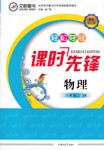题目内容
. School children must be taught how to deal with dangerous ________.
A. states B. conditions C. situations D. positions
C

 文敬图书课时先锋系列答案
文敬图书课时先锋系列答案Remember those big, colorful books with large pictures of balls or apples when you were a little kid? Those have proven to be helpful, according to a number of studies. Between 1 and 5 years old, introducing books to Children can help greatly because this is usually the age when intellectual (智力的) capabilities form.
At age 1 to 5, a child can decide whether he wants to learn or wants to be a good learner. The road to learning starts here. Their curiosity (好奇) and imagination are fed with the many pictures, sounds and colors in the books.
Children normally began school at 5 years old. But today, they go to school when they are as young as one and a half years old. This is because many parents have recognized that influencing the child's formative years (性格形成时期) is very important. The fight influence can make the child want to read in the future.
Parents should play a part in encouraging children to read. Even just reading them bedtime stories can help children feel the joy and amazement connected to reading. This can help them become better readers and better learners as they grow older.
If children are interested in reading books rather than watching television, they can improve many skills besides reading and learning. Books can act as stepping stones to intelligence. However, parents must be very careful not to overpower their children. If they force children to read books that are too hard to understand, they might think reading is boring and lose interest in it.
1.. This passage mainly ______.
|
A.advises kids to spend less time watching TV |
|
B.explains why reading is good for us |
|
C.tells us that reading is good for children |
|
D.suggests that parents spend more time with their kids |
2..Why does introducing books to kids between 1 and 5 years old help them greatly?
|
A.Because this is a good way to keep them away from television. |
|
B.Because it makes them become interested in going to school. |
|
C.Because it helps them learn much faster when they are older. |
|
D.Because it is usually the age when intellectual capabilities form. |
3..It is implied in the passage that _____.
|
A.the writer read a lot of books when he was a child |
|
B.parents should never force their children to do anything |
|
C.the formative years may begin at one and a half years old |
|
D.a child's formative years are earlier than before |
4..In the writer’s opinion, _____.
|
A.children should read all kinds of books |
|
B.children should only read books with pictures |
|
C.books can help children become cleverer |
|
D.bedtime stories make children love their parents more |
One day, when I was in high school, I saw a kid named Kyle from my class walking home from school with all his books, I thought to myself, “__26___ would anyone bring home all his books for the weekend? He must really be 27___.”As I was walking, I saw several kids running toward him. They ran at him, 28 all his books out of his arms and he fell down in the dirt, His glasses went 29 and landed in the grass.
My 30 went out to him. So, I ran over to him. 31 I handed him his glasses, he looked at me and said, “Hey, thanks!”
I helped him pick up his books, and asked him where he lived. As it 32 , he lived near me. We talked all the way home. Over the next four years, Kyle and I became best friends.
Kyle was the 33 __student of our class, one of those guys that really found themselves during high school. Therefore he had the 34 to prepare a 35 speech. On the graduation day, I could see that he was 36 .So, I patted him on the back and said, “Hey, big guy, you’ll be 37 !” He looked at me and smiled.
He cleared his throat, and began. “Graduation is a time to 38 those who helped you make it through those 39 years. Your parents, your teachers… but mostly your friends, I am here to tell all of you that being a friend to someone is the best 40 you can give him.”
I just looked at my friend with 41 as he told the story of the first day we met. He had planned to 42 himself over the weekend and was carrying his books home. “Thankfully, nothing happened. My friend 43 me from doing the unspeakable.”
Not until that moment did I realize that you should never underestimate(低估) the 44 of your actions. With one small gesture you can 45 a person’s life. For better or for worse.
|
1. |
|
|
2. |
|
|
3. |
|
|
4. |
|
|
5. |
|
|
6. |
|
|
7. |
|
|
8. |
|
|
9. |
|
|
10. |
|
|
11. |
|
|
12. |
|
|
13. |
|
|
14. |
|
|
15. |
|
|
16. |
|
|
17. |
|
|
18. |
|
|
19. |
|
|
20. |
|



